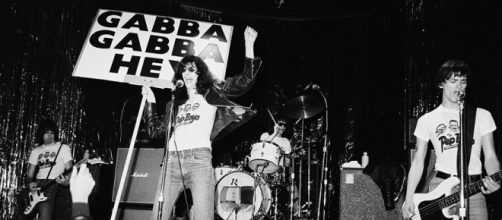With nationalistic political movements seizing power left and right, the world has been thrust into a frenzy as everyone rushes to draw their own lines in the sand. Assuming you weren’t born yesterday, this is likely not an earth-shattering observation, considering humanity has been gradually dialing up the volume on our collective screeching for a few years now. One could even argue that people who actually were born yesterday have probably already had to confront this in some shape or form. For better or for worse, Politics is inescapable.
The ripple effects have by no means fallen on deaf headphones.
The classic rejection of conservatism by young music fans and the artists that represent them is snowballing back to life more and more by the day, and it seems to be only the beginning. While it may be too early (and potentially too popular) to label it a true counterculture uprising, there is a rebellious familiarity to the phenomenon that is worth exploring.
Looks like a punk, swims like a punk, and quacks like a punk
While some of the genre’s icons were ironically quite gimmick-indulgent (not naming names but you know who you are Richard Hell), traditional Punk was defined simply by a rejection of bootlicking. It did not sell images, it rejected hierarchies, and it refused to comply in the subtle popularity contests of everyday life.
While a lot of this antagonistic focus was on the music industry itself, it was famously unshy in taking on the government as well.
In the context of modern society, all of this fits like a glove. The idea of kissing up to the establishment (see also: the swamp) has even become unpopular amongst conservatives. Controversial leaders all over the world have been winning elections on the promise of unrestrained bluntness.
However, whether or not they are delivering is the source of universal debate, and that is what has become society’s (and by extension, music’s) most volatile pressure point.
Don’t call it a comeback: punk's second life
When you hear punk, you likely think of the more topical traits of the scene. Images of safety-pinned leather jackets on angry British teenagers may come to mind.
Logically, you understand that not every single punk artist embodied the Sex Pistols-esque brand to a T. It’s just a representative caricature, something every genre of music has.
That being said, punk was an ideology just as much as a sound or a look. The lack of buzzsaw guitar on the radio doesn’t speak for the state of the genre, and it doesn’t just live in the fractured remains of pop punk, dream pop, or wherever else you can find a moody white boy with a guitar either. It is, by definition, not a slave to any uniform. The very nature of it guarantees eternal fluidity as the same old motives are just filtered through new contexts.
She may not sound the part, but Charli XCX is punk. The same goes for M.I.A., Danny Brown, St.
Vincent, Blood Orange, Sufjan Stevens, Death Grips, and any other artist willing to bluntly explore their own nuance at the risk of commercial loss. Nothing is more inherently punk than Profiles In Courage-esque integrity.
For an even more direct example, just look to the musicians from all genres who have directly spoken against oppressive systems recently. Through artists like Kendrick Lamar and A Tribe Called Quest, we have seen rap, of all things, become one of the punk philosophy’s most obvious disciples. The different sound is just a new method of delivery
Punk nuance has existed forever (insert clever pun about Johnny Cash and Grandmaster Flash) and it has become the catalyst through which the soul of the genre still thrives.
Purists may argue against such a meta method of music-sorting, and it would be a fair point. That being said, in a time when an increasingly large number of people need something to scream at the establishment for, I maintain that the pool of options is not as shallow as it may seem.

